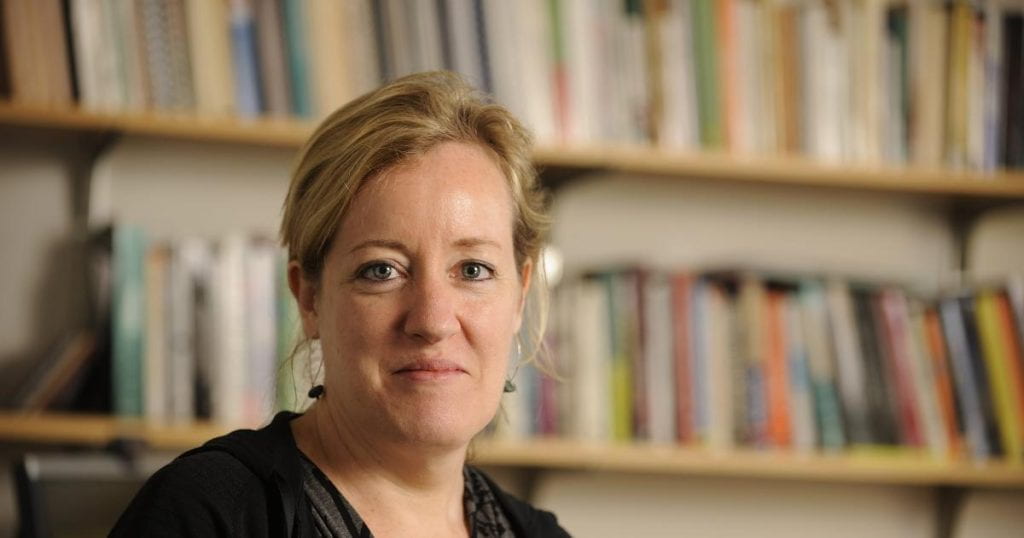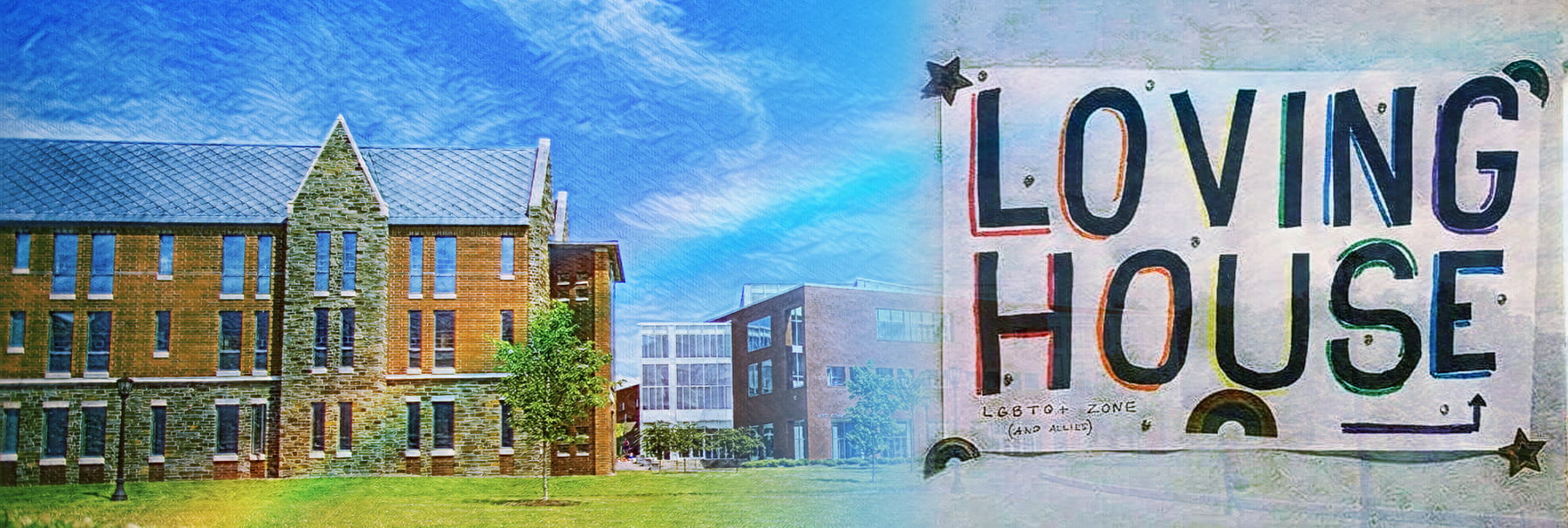
Embrace the Spectrum: Creation of Queer Inclusive Housing at Cornell
It wasn’t until I listened to the interviews and took a deep dive into the archives that I understood how impactful Loving House is on the past, present, and future of LGBTQ+ community members of Cornell.
Taylor Bouraad, Co-founder of Loving House
Peruse documents from the Cornell University Archives that the authors researched in preparation for creating this story.
View a selection from the archives.
“Embrace the Spectrum: Creation of Queer Inclusive Housing at Cornell” explores the founding of Loving House, the LGBTQ+ Living Learning Unit located in Mews Hall on North Campus. The founding of Loving House was 25 years in the making, beginning with queer student advocacy from the early 1990s. It is an important story to share as several members of the Cornell community united to provide queer students with an additional home on campus, a true of example of creating spaces of inclusion for those who have been historically excluded. Students in the Learning Where You Live course, Optimizing Your First Year Experience: Queer Identities and Beyond, worked together to put the many pieces of Loving House’s foundation together. The stories of those who were instrumental in the development of Loving House are elevated in this story.
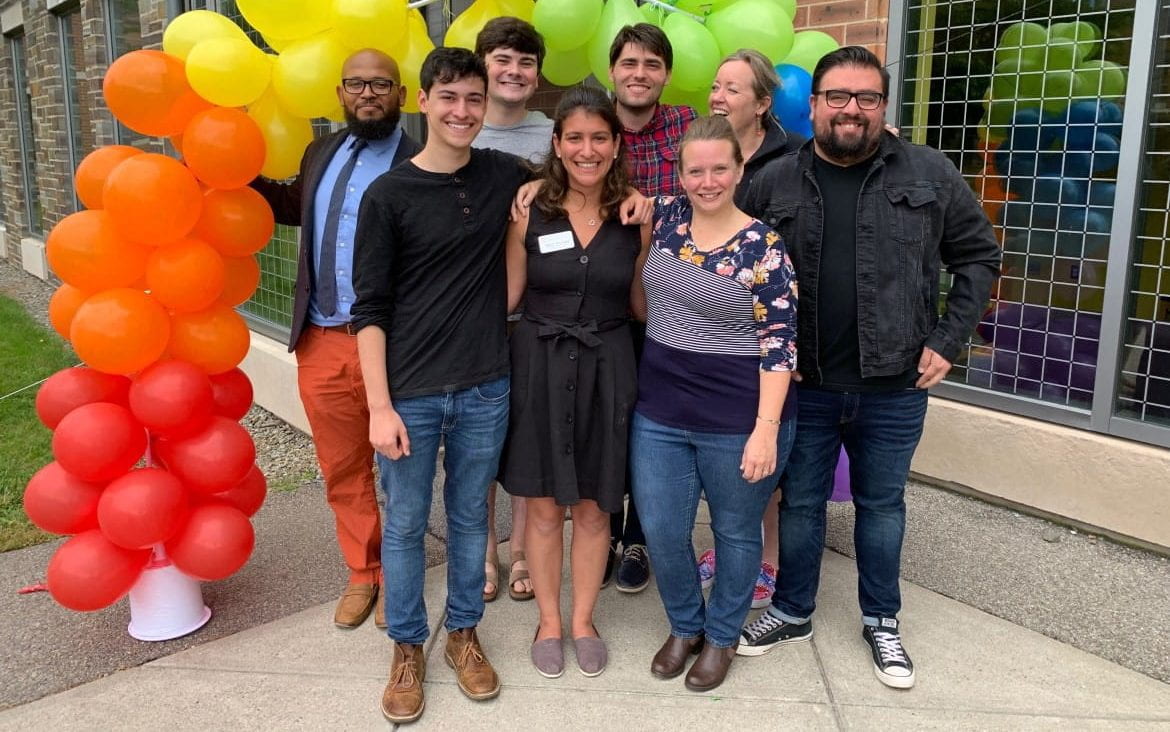
As the founding residence hall director of Loving House, prior to this project, the history of advocacy for the space was in the rearview mirror. After leading students in this project, I realized the history was guiding our future. It wasn’t until I listened to the interviews and took a deep dive into the archives that I understood how impactful Loving House is on the past, present, and future of LGBTQ+ community members of Cornell. The story touches on the climate for LGBTQ+ students both on campus and nationally, shaping the advocacy for the space and shapes what alum and current students are for the future.
Interviews
Interviewer: Julianna Castlegrant and Jillian Creighton
Open transcript of Joseph L. Barrios interview in new window
Joseph L. Barrios ’93 was the gay/lesbian/bisexual liaison at-large during the first attempt to establish a Gay/Lesbian/Bisexual Living Learning Unit at Cornell University. At that time, violence was being directed towards the queer community. Moved to action, Barrios used his position as the LGB liaison and worked with others to put forth the first resolution demanding the establishment of a Gay/Lesbian/Bisexual Living Learning Unit in December 1992. The effort was vetoed by President Frank T. Rhodes, who called for more studies on the issue. Barrios and others did as Rhodes said and held multiple debates on the pros and cons of such a living learning unit, as well as polled the student body for their opinions, the results being split evenly: ⅓ in favor, ⅓ opposed, and ⅓ indifferent. Upon passing a second resolution in March 1993, President Rhodes permanently vetoed it, stating that the university did not want to go down the path of creating more special housing for separate groups.
The idea for creating a queer living learning unit at Cornell sat in the form of those vetoed resolutions for the next twenty-five years in Cornell’s archives. When the Loving House was officially approved to be placed in Mews Hall in 2019, Barrios noted that, “It finally came at the time it was most needed…finally came full circle because that wheel of progress does not necessarily go forward, right? It can go backwards, too.”
Interviewer: Megan Cowart and Gabrielle Schnorbus
There had been significant community activism before the founding of Loving House in 2019. Particularly in the 90s, there were efforts to organize the queer community to ensure better protection. Joyce Muchan ’97 was involved with the passing of the Local Law C ordinance that aimed to protect queer individuals against discrimination in the workplace, housing situations, etc. Although the ordinance failed before the Ithaca County Legislature initially, it was eventually passed and was the first of its kind in the country. Then as a student at the ILR school, Joyce Muchan organized with other students such as Carla Guzman and Eduardo Peñalver in the Day Hall Takeover in 1993. The takeover was in response to the defacing of a Latino artist’s artwork. As a result, several student groups created a coalition and occupied Day Hall for three days to bring visibility to the discrimination of minorities on campus. Some of the demands of this protest were a Latino living center and queer housing. Although the first demand was met, the queer community only received an office in the basement of Anabel Taylor Hall. For many students, Muchan included, this was a compromise and not an accomplishment. Muchan emphasizes the importance of remembering LGBTQ history at Cornell and remembering those who have been erased from the narrative. It is her hope students today will reach out to alumni, so that alumni see the fruits of their labor and how far the university has come since they initially requested queer housing during the takeover. Muchan encourages students to be activists and to be the change in the community that they want to see.
New resolutions and the founding of Loving house (2017-present)

Interviewer: Uma Jhaveri and Diego Virtue
Ian Wallace ’20 was the driving force behind the Student Assembly in pushing for LGBTQ+ housing on campus. In his freshman year, he decided this was going to be his project while at Cornell. He never thought it would get passed while he was still there and especially didn’t think he would be living there his senior year.
Wallace was a member of Haven (the LGBTQ student union) starting in his freshman year, and he soon made friends with senior Beckett Harvey, who could see Wallace’s potential to create real change at Cornell. Harvey told Wallace of the Student Assembly Resolution of ‘92 that called for an LGB Living Loving Unit. From that information, Ian Wallace found a box in the Cornell Archives that acted as a time capsule to preserve all the work the group had done back in ‘92. The box inspired Wallace, and that was when he realized what he wanted to do—he wanted to finish what the group had started. He got connected with Joe Anderson who was another student interested in making this a reality, and they got to work.
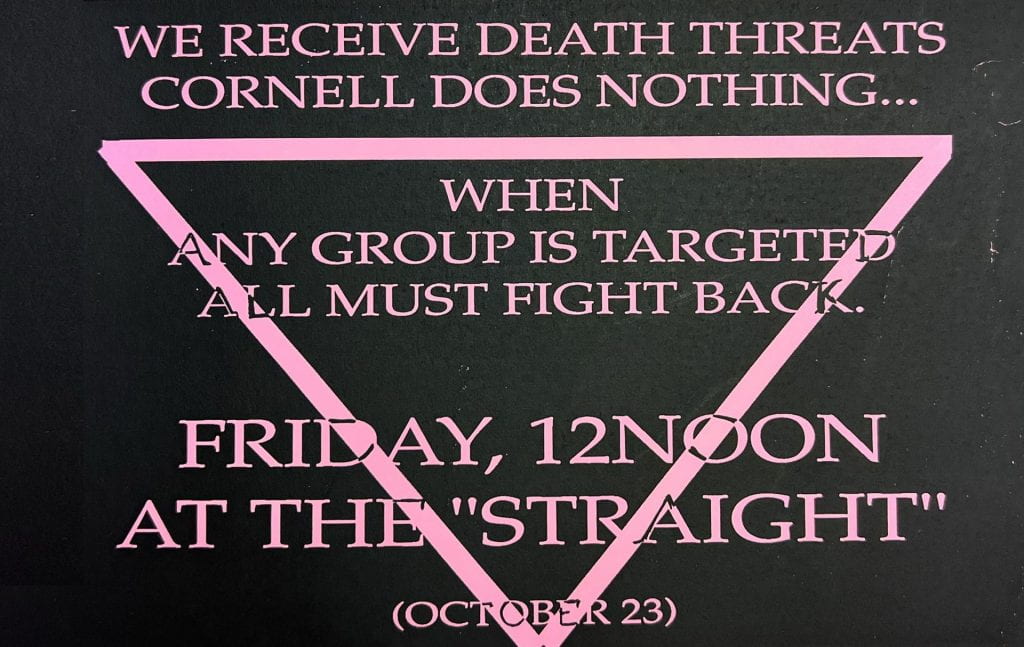
In the group above, add an Image. Be sure to include the caption that will appear below the image on the screen.
All museum lightbox text should be entered in this group. (The three lines at the top left can be clicked to show you the element hierarchy.)
Wallace decided the Student Assembly would be his best opportunity to get the attention of administrators and get the ball rolling. The LGBT student representative spot was vacant in the Student Assembly, so Wallace decided to fill it. He worked with a close-knit group of students and administrators who were very supportive of the idea. By November 2017, the resolution passed, and it was approved by President Pollack the very next year. They proposed opening the LGBT living unit in Edgemoor, an old fraternity house, but the administration suggested Mews. Wallace was shocked and enthused by this suggestion, as he hadn’t even realized it was an option.
Wallace came up with the name “Loving House” from the Loving v. Virginia court case. This case was what legalized interracial marriage in the United States, and he thought it would be an appropriate name for the LGBT living loving unit.
The key shift in the approval of program houses across campus was not one thing, but many slow and gradual changes in the years between the initial suggestion for Loving House and 2019, when it first opened for students to live in. It was a shift in attitude about LGBT+ students and a shift towards understanding why a safe space would be beneficial as opposed to creating division. Many initially feared that the creating of an LGBT+ program house would force an unnecessary divide between LGBT+ and cis/straight individuals on campus. With time, it became clear to many students and faculty members that having a safe and supportive environment for LGBT+ students on campus would foster growth and a supportive community. Homosexuality becoming slightly less stigmatized and more accepted by the overall Cornell body was a necessary change of perspective that allowed for the creation of Loving House.
Lori Leonard is a professor in the department of global development and a faculty-in-residence at Mews Hall and Loving House. As the previously established faculty-in-residence for Mews Hall, she was involved in the founding of Loving House and is on the steering committee that selects who lives in Loving House. Loving House taught her how important it is for marginalized communities to have spaces of total acceptance, where they don’t have to worry about hiding who they are.
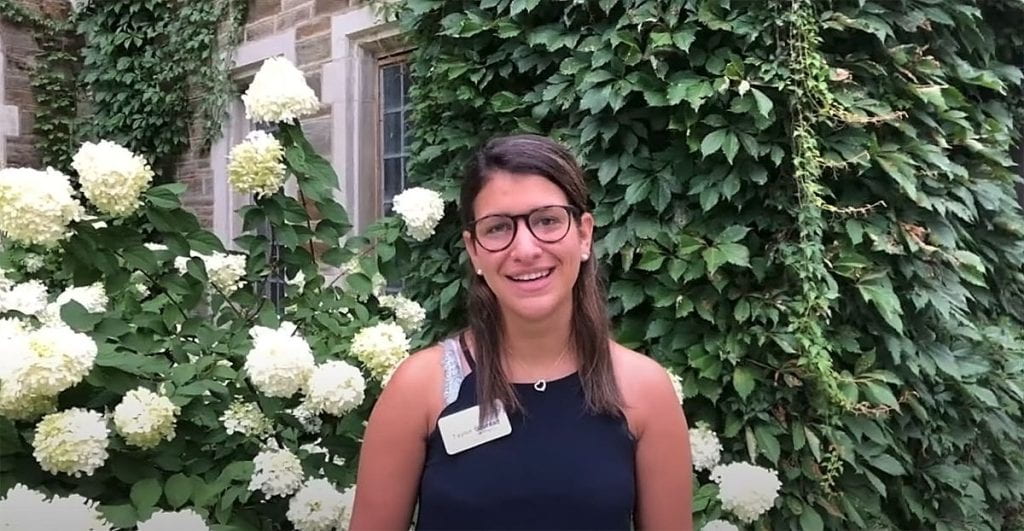
Interviewer: Emma Wu and Daniela Rojas Wise
Taylor Bouraad became the Residence Hall Director for Mews Hall in July 2018. Bouraad wasn’t aware of the university’s plans to implement an LGBTQ+ living and learning center when she applied for the RHD job, but clearly, it was fate, because she has been the biggest driving force in creating and running the program house. Taylor literally made Loving House what it is today. She has given students a safe space to be themselves and to explore their identities. Because Taylor is so unapologetically herself, students feel like they can be themselves in Loving House; in being so involved with Loving House, she created its atmosphere of acceptance.
Interviewer: Taylor Bouraad
Matt Carcella is currently the Senior Director for Diversity Alumni Programs. He joined Cornell in 2009 as the director of the LGBT resource center at a time before many legal protections for the Queer community were in place. He remembers the growing momentum for activism and advocacy. Over time, he has seen improvements in the campus climate, sometimes with big wins, sometimes with small wins. The visible community of ‘out’ students is now larger. Aspects of how we understand identity have changed as well, including the more nuanced ways we now talk about gender and sexual orientation. For him, the history of Loving House is a ‘frustratingly positive story” and stresses how essential it is to see visible evidence of a ‘win’ in their struggles. He sees Loving House as providing ‘a sense of home, a true sense of home’.
Interviewer: Michelle Song and Leanna Skeete
Ryan Lombardi is the current Vice President for Students and Campus Life at Cornell. In fall 2017, Ian Wallace ‘20 and Joe Anderson ’20 approached him about the idea of creating a LGBTQ+ housing unit on campus. He was enthusiastic and encouraged them to submit official resolutions. After the resolutions were accepted, Ryan Lombardi then charged a working group with figuring out the details and logistics and the process of establishing Loving House proceeded fairly quickly. Ryan articulated the value of the Loving house, by sharing that “one of the most important things for a student to be able to do in college is to develop confidence and a sense of self.” Spaces like the Loving House help students develop confidence and gives them stability, which will help them be successful. Even if an individual student does not live there, if they identify with this community, it can affirm who they are and their identity at Cornell. It is also very affirming to alumni.
